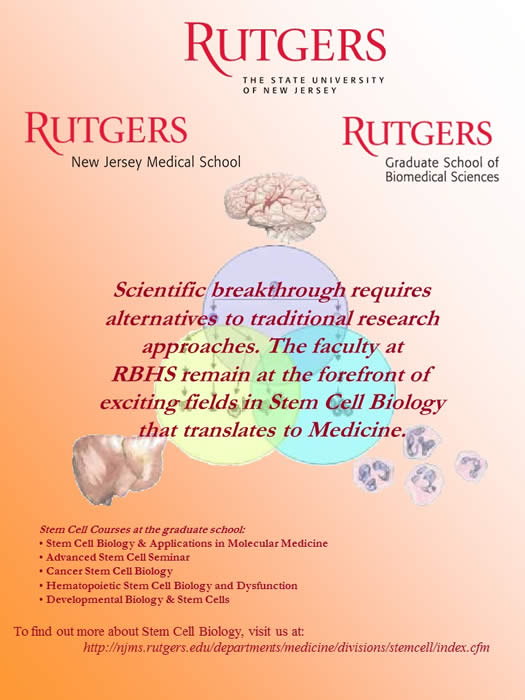
 This goal of this didactic course is to provide a broad overview of various types of stem cells and to provide insights how stem cells can be maintained by the tissues niche/microenvironment. The course
will cover stem cell development from blastocyst to the somatic stages. There will be an emphasis on the development of hematopoietic stem cells beginning from the embryo to fetal and then adult. Different types of bone
marrow-derived stem cells will also be discussed such as mesenchymal stem cells.
The course will cover the science involved in tissue protection and regeneration. Clincal scenarios will be used to explain the scientific points of each topic. As an example, the course will take lessons learnt from the field of bone marrow transplantation and then use the information as a framework to discuss today's application of stem cells.
This goal of this didactic course is to provide a broad overview of various types of stem cells and to provide insights how stem cells can be maintained by the tissues niche/microenvironment. The course
will cover stem cell development from blastocyst to the somatic stages. There will be an emphasis on the development of hematopoietic stem cells beginning from the embryo to fetal and then adult. Different types of bone
marrow-derived stem cells will also be discussed such as mesenchymal stem cells.
The course will cover the science involved in tissue protection and regeneration. Clincal scenarios will be used to explain the scientific points of each topic. As an example, the course will take lessons learnt from the field of bone marrow transplantation and then use the information as a framework to discuss today's application of stem cells.
Due to the rapid information on stem cells text books should be used for basic information. There is no recommended text book for this course. Students will be provided with password-protected powerpoint slides for each lecture, which will be recorded.
This course allows for interaction among students and the instructor. The goal is to provide students with
information on the translational landscape of all types of stem cells. The class will be provided with recent
publications that are representative of all fields in which stem cells are applied. These fields include, but are not limited to hematopoiesis, tissue engineer, drug delivery, other stem cells, clinical trials based on stem cell applications. It is expected that the discourse will emphasize the
implications to current and future treatment for all clinical disciplines.
Students in MSBS5120 (Monday's class) are encourage to enroll in the advance class. Students
who have taken one of the core graduate courses or have a background in biology or biochemistry could enroll in the course.
Students will learn about hematopoietic dysfunction and gain insights into how research innovation is translated to treatments. The content of the course adds to a major emphasis on translational medicine at Rutgers University, and fits with graduate-level translational science courses offered through the Department of Medicine. Students with backgrounds in bone marrow functions will begin to understand the value of studying normal and dysfunctional systems in stem cells as an effective approach in translational research. The lectures emphasize interactions between cells (including hematopoietic stem cells) and secretome of the bone marrow microenvironment. Students will meet experts in the field of hematology. All students will benefit from this course: those with plans for careers in pharmaceutical and biotechnology companies, dentistry, medicine and basic or translational research through the PhD or MD/PhD programs.
The purpose of this course is to provide students with an understanding of
the field of cancer stem cells and for them to appreciate the need for basic researech to unravel how the field develops. The students will gain insights on translational science, while developing an understanding of the strength of
interdisciplinary science. In addition, the students will begin to understand
how the general field of stem cell biology can be extrapolated to identify
cancer stem cells. By the end of the course the students will learn how to
integrate different fields, such as basic biology: biochemistry, cellular and
molecular biology with stem cell biology.
The course is offered during summers and will include didactic
lectures and discussions of recent literature on cancer stem cells from solid
tumors and hematological malignancies. The students are expected to have a
background in stem cell biology.
